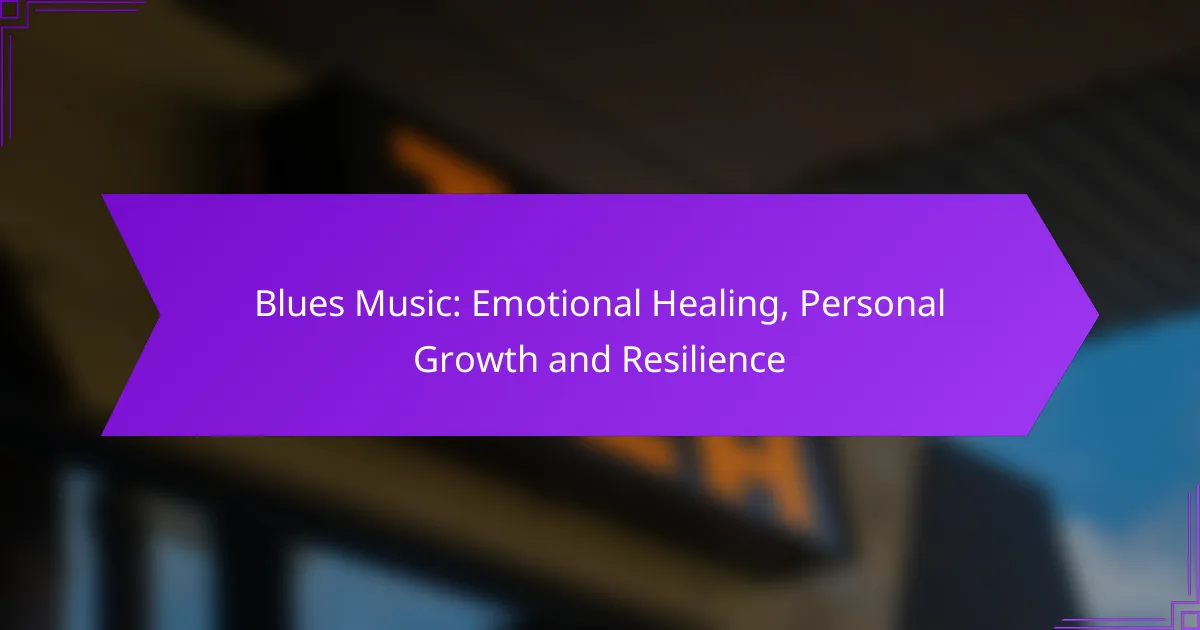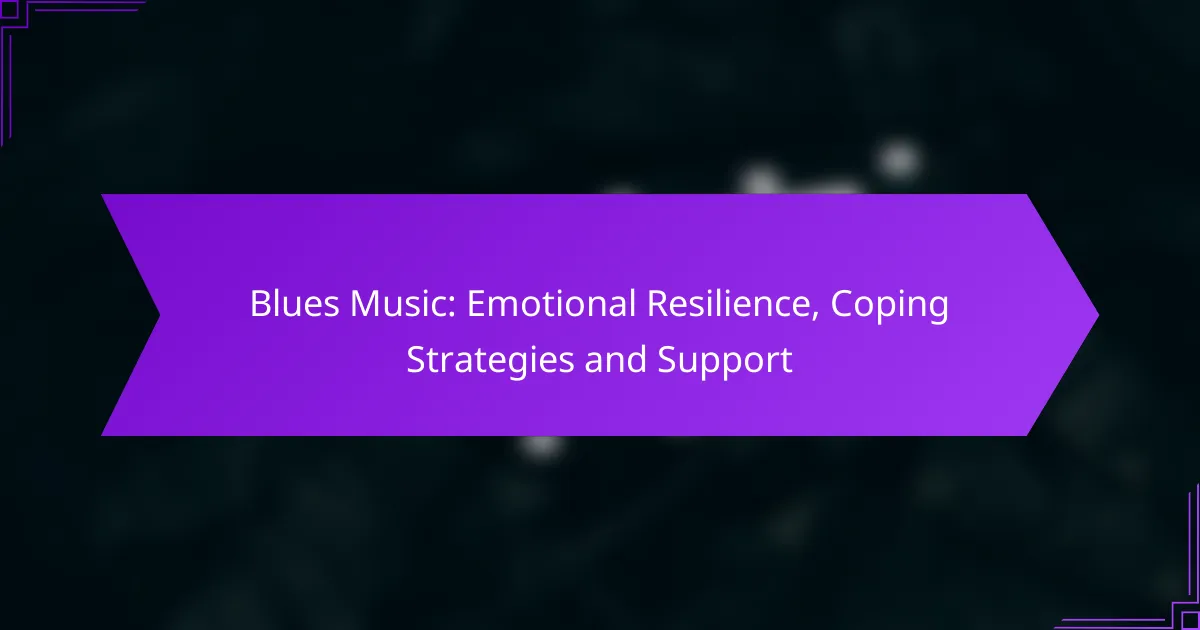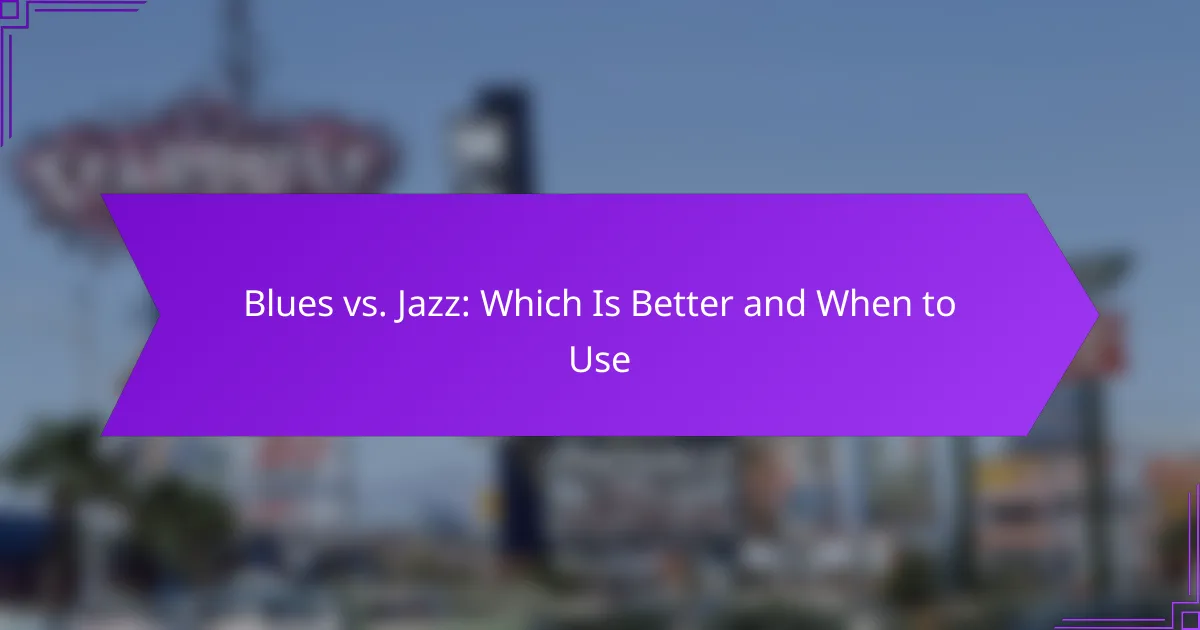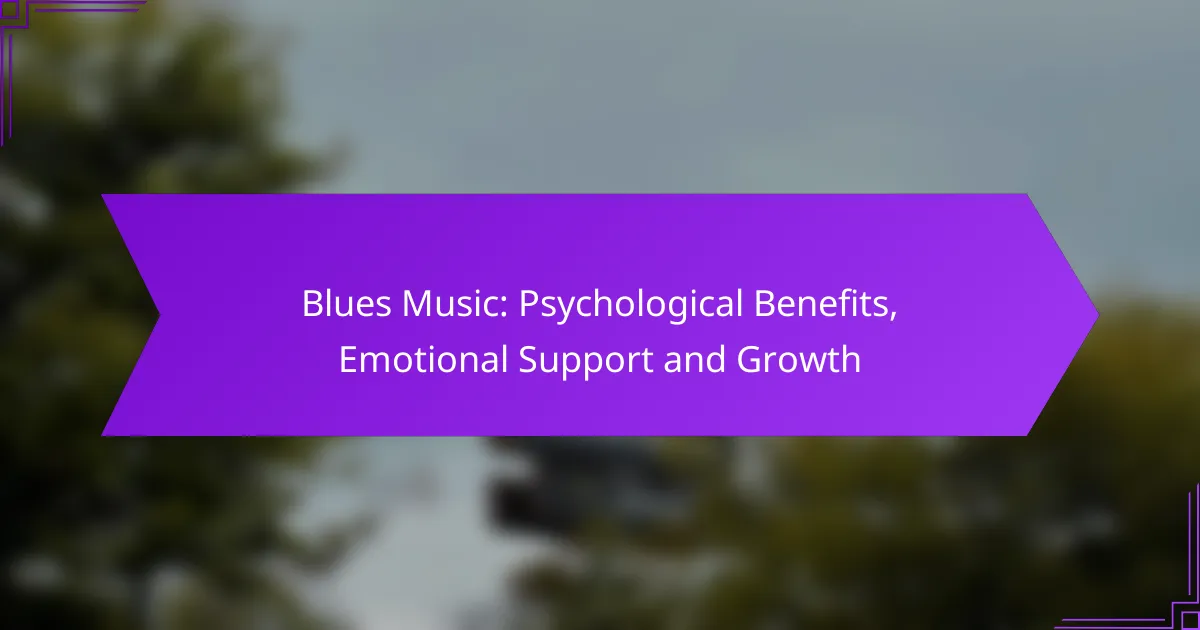Blues music serves as a profound tool for emotional healing, allowing individuals to express their pain and connect with the shared experiences of others. Its themes of sorrow and resilience not only resonate deeply but also facilitate personal growth by encouraging emotional expression and coping strategies. Through engaging with blues, listeners can navigate life’s challenges and find strength in their struggles.

How can blues music aid emotional healing?
Blues music can significantly aid emotional healing by providing a means of expression and connection for individuals experiencing pain or distress. The genre’s themes of sorrow, resilience, and hope resonate deeply, allowing listeners to process their emotions and find solace.
Therapeutic benefits of blues music
The therapeutic benefits of blues music include its ability to evoke emotions and promote catharsis. Listening to blues can help individuals confront their feelings, leading to emotional release and relief. Additionally, the music’s soulful melodies can create a calming environment that fosters introspection and healing.
Engaging with blues music, whether through listening or playing an instrument, can also enhance mood and reduce stress. The rhythmic patterns and lyrical storytelling can serve as a distraction from daily worries, providing a mental break that contributes to overall well-being.
Case studies of emotional recovery
Numerous case studies illustrate the role of blues music in emotional recovery. For instance, individuals recovering from trauma have reported that blues music helped them articulate their experiences and feelings, facilitating a path toward healing. In some cases, group therapy sessions incorporating blues music have shown improved emotional expression among participants.
Another example includes musicians who turned to blues as a coping mechanism during difficult times. Their personal stories often highlight how creating or performing blues music has been instrumental in overcoming challenges, reinforcing the genre’s power as a tool for emotional resilience.
Blues music in mental health therapy
Blues music is increasingly being integrated into mental health therapy as a form of expressive art therapy. Therapists utilize blues music to help clients explore their emotions and experiences, creating a safe space for discussion and reflection. This approach can be particularly effective for individuals dealing with depression or anxiety.
Incorporating blues music into therapy sessions can also enhance engagement and motivation. Clients may find it easier to open up when discussing their feelings in relation to the music, allowing for deeper therapeutic connections and insights. This method emphasizes the importance of cultural relevance in mental health practices, making therapy more relatable and impactful for those who resonate with the blues genre.
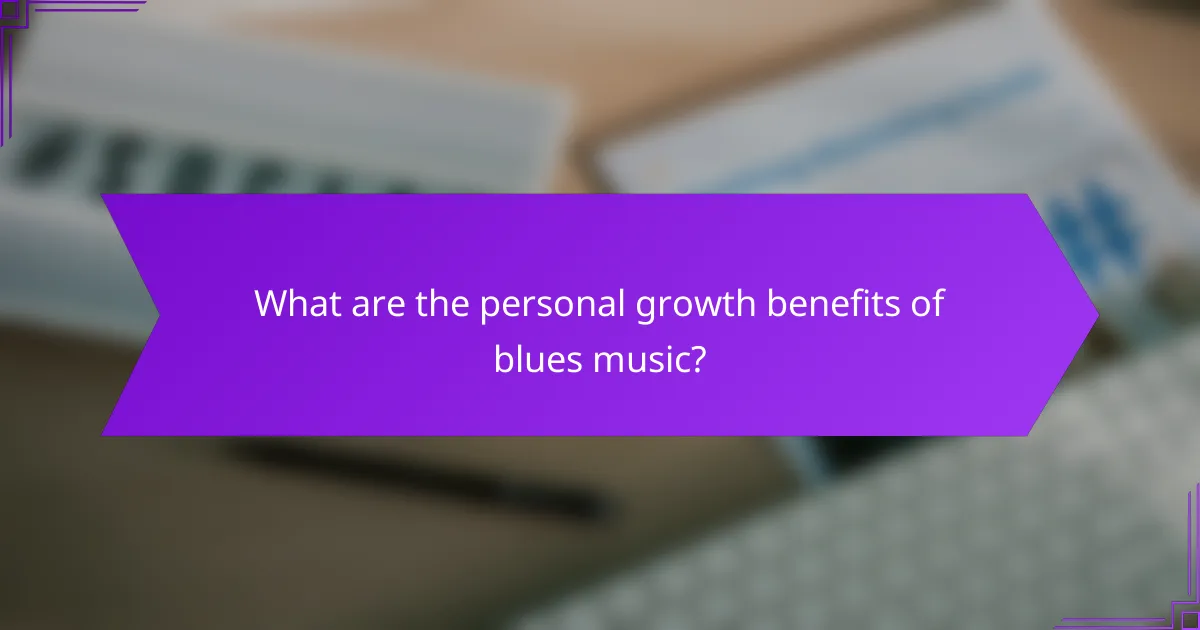
What are the personal growth benefits of blues music?
Blues music offers significant personal growth benefits, including enhanced emotional expression, resilience building, and transformative experiences. Engaging with blues can help individuals process emotions and navigate life’s challenges more effectively.
Self-expression through blues
Blues music serves as a powerful outlet for self-expression, allowing individuals to articulate their feelings and experiences. The genre’s raw emotional depth encourages listeners and musicians alike to confront their struggles and share their stories.
By writing or performing blues songs, individuals can explore personal narratives, which can lead to greater self-awareness and emotional clarity. This process fosters a sense of connection with others who may share similar experiences, enhancing community bonds.
Building resilience with blues music
Engaging with blues music can help build resilience by providing a framework for coping with adversity. The themes often found in blues songs—loss, heartache, and perseverance—mirror real-life challenges, offering listeners a sense of solidarity and hope.
Listening to or playing blues can serve as a reminder that struggles are a part of life, and overcoming them is possible. This perspective can empower individuals to face their own difficulties with renewed strength and determination.
Transformative stories from blues artists
Many blues artists have shared transformative stories that highlight the genre’s impact on personal growth. For instance, legends like B.B. King and Muddy Waters often drew from their own hardships, using their music to navigate and overcome life’s obstacles.
These narratives not only inspire listeners but also demonstrate how blues music can facilitate healing and personal development. By connecting with these stories, individuals can find motivation and encouragement in their own journeys of growth and resilience.
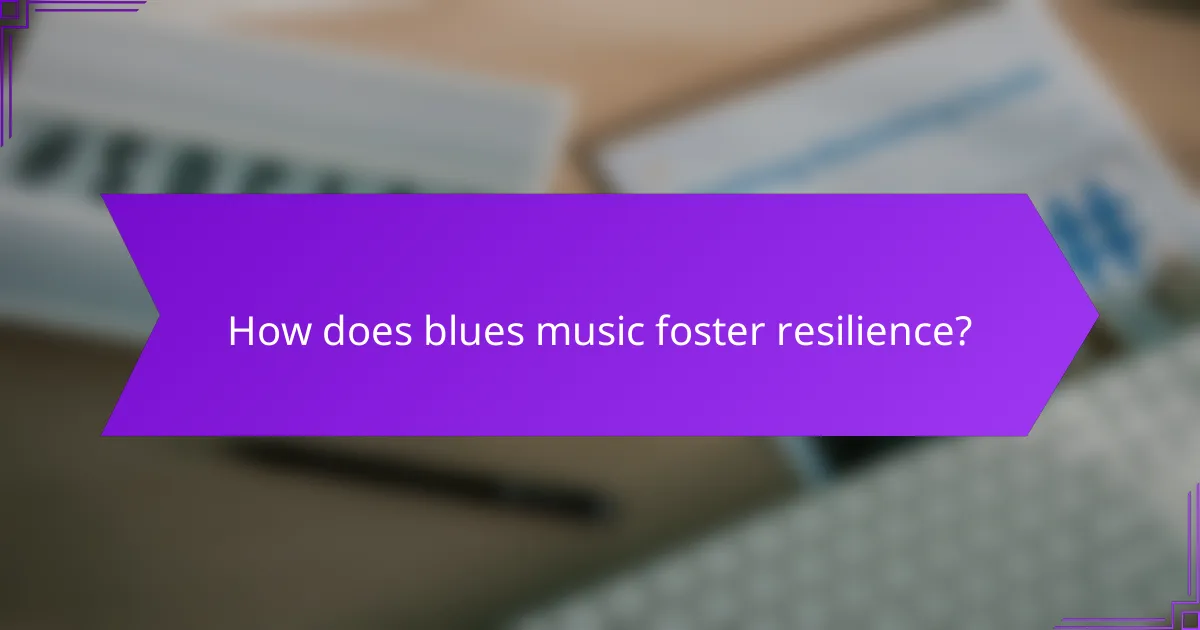
How does blues music foster resilience?
Blues music fosters resilience by providing a powerful outlet for expressing emotions and coping with life’s challenges. Through its themes of struggle and perseverance, it encourages listeners to confront adversity and find strength in their experiences.
Overcoming adversity through blues
Blues music often tells stories of hardship and overcoming obstacles, reflecting the lived experiences of many artists. This genre serves as a reminder that struggles are universal, and through music, individuals can find solace and inspiration. For example, songs that narrate personal battles can empower listeners to face their own challenges with renewed determination.
Artists like B.B. King and Muddy Waters have used their life stories to create music that resonates with those facing difficulties, illustrating how personal narratives can transform into collective resilience.
Blues as a coping mechanism
Listening to blues can be an effective coping mechanism for dealing with emotional pain and stress. The genre’s slow tempo and soulful melodies allow individuals to process their feelings, providing a therapeutic experience. Engaging with the music—whether through listening or playing—can facilitate emotional release and healing.
Moreover, writing blues lyrics can serve as a form of self-reflection, helping individuals articulate their emotions and experiences. This creative expression can lead to personal growth and a deeper understanding of oneself.
Community support in blues culture
The blues community plays a vital role in fostering resilience through shared experiences and support. Local blues clubs and festivals often create a sense of belonging, where individuals can connect over mutual struggles and triumphs. This camaraderie reinforces the idea that no one is alone in their challenges.
Additionally, mentorship within the blues scene can empower emerging artists, providing them with guidance and encouragement. By sharing knowledge and experiences, seasoned musicians help nurture resilience in the next generation, ensuring the continuation of this rich cultural tradition.

What are the key elements of blues music?
The key elements of blues music include its distinct musical structure, emotional themes, and cultural roots. Blues often features a twelve-bar format, expressive lyrics, and a focus on personal experiences, making it a powerful medium for storytelling and emotional expression.
Musical structure and themes
The musical structure of blues typically revolves around a twelve-bar format, which consists of three chords played in a specific pattern. This structure allows for improvisation and variation, giving artists the freedom to express their emotions through their performances.
Themes in blues music often revolve around hardship, love, and resilience. Lyrics frequently reflect personal struggles, societal issues, and the quest for emotional healing, resonating deeply with listeners and creating a strong connection between the artist and the audience.
Influential blues artists
Several artists have significantly shaped the blues genre, each bringing their unique style and perspective. Notable figures include B.B. King, known for his expressive guitar work and heartfelt vocals, and Muddy Waters, who played a pivotal role in the development of electric blues.
Other influential artists like Etta James and Howlin’ Wolf have also left a lasting impact on the genre, inspiring countless musicians across various styles. Their contributions have helped to elevate blues music and ensure its relevance in contemporary music culture.
Regional variations of blues music
Blues music has evolved into various regional styles, each reflecting the local culture and influences. The Delta blues, originating from the Mississippi Delta, is characterized by its raw, acoustic sound and emotional depth, often featuring slide guitar techniques.
In contrast, Chicago blues incorporates electric instruments and a more urban sound, showcasing a different approach to rhythm and arrangement. Other regional styles, such as Texas blues and Piedmont blues, further illustrate the diversity within the genre, each offering unique characteristics and storytelling methods.

How to incorporate blues music into personal development?
Incorporating blues music into personal development can enhance emotional healing, foster personal growth, and build resilience. By actively engaging with blues music through playlists, workshops, and community involvement, individuals can tap into the genre’s rich emotional landscape and transformative power.
Creating a blues-inspired playlist
Start by curating a playlist that resonates with your emotions and experiences. Include classic blues artists like B.B. King, Muddy Waters, and Etta James, as well as contemporary musicians who bring fresh perspectives to the genre. Aim for a mix of upbeat tracks to uplift your spirits and slower, soulful songs that allow for reflection.
Consider organizing your playlist by themes such as heartbreak, joy, or resilience. This can help you access specific emotions when needed. Regularly update your playlist to keep it relevant to your personal journey and emotional state.
Participating in blues workshops
Joining blues workshops can provide hands-on experience and deepen your understanding of the genre. Look for local music schools or community centers that offer classes in blues guitar, songwriting, or vocal techniques. These workshops often foster a supportive environment for personal expression and creativity.
Engaging with instructors and fellow participants can lead to valuable feedback and new perspectives on your musical journey. Be open to experimenting with different styles and techniques, as this can enhance your personal growth and emotional exploration.
Engaging with local blues communities
Connecting with local blues communities can enrich your experience and provide a sense of belonging. Attend live performances, open mic nights, or jam sessions to immerse yourself in the culture and connect with like-minded individuals. These events often serve as platforms for sharing stories and experiences through music.
Consider joining social media groups or local clubs dedicated to blues music. This can help you stay informed about upcoming events and opportunities to collaborate with others. Building relationships within these communities can offer support and encouragement as you navigate your personal development journey through blues music.
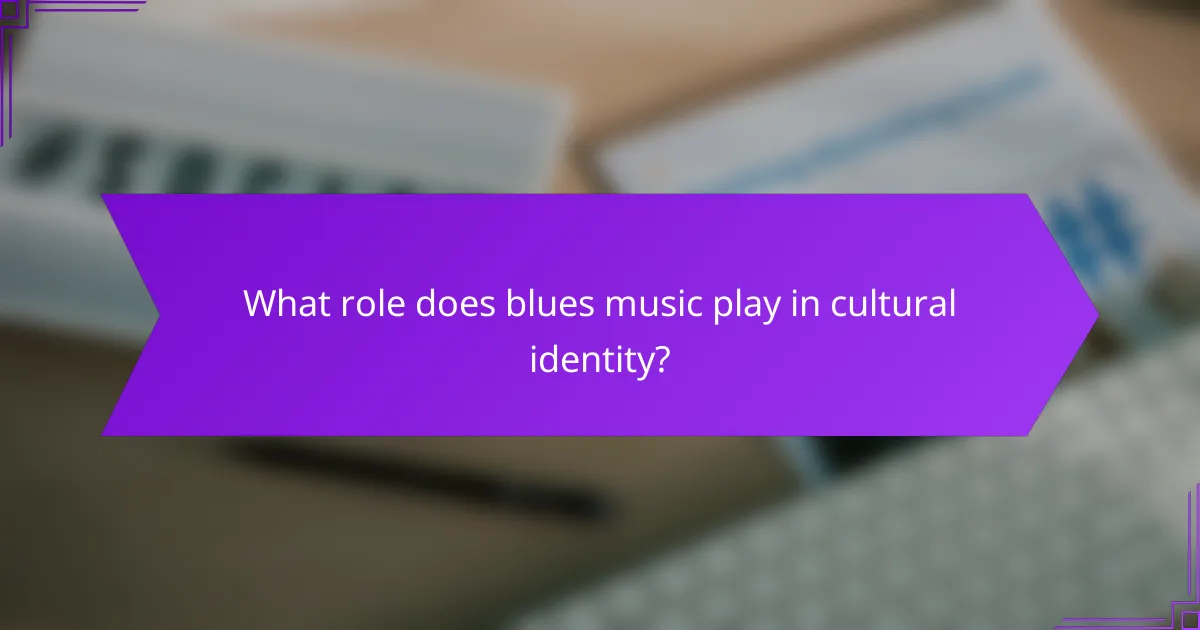
What role does blues music play in cultural identity?
Blues music serves as a vital expression of cultural identity, particularly within African American communities. It encapsulates historical experiences, emotions, and social struggles, fostering a sense of belonging and continuity.
Historical significance of blues music
The historical significance of blues music lies in its roots in the African American experience, particularly in the Deep South during the late 19th and early 20th centuries. It emerged from a blend of African musical traditions, spirituals, and folk songs, reflecting the hardships and resilience of its creators.
Blues music played a crucial role in the cultural landscape of America, influencing various genres such as jazz, rock, and R&B. Its storytelling nature provides insight into the social issues faced by African Americans, making it an important historical document.
Blues music and African American heritage
Blues music is deeply intertwined with African American heritage, serving as a voice for the community’s struggles and triumphs. It often addresses themes of love, loss, and perseverance, resonating with listeners on a personal level.
Through its evolution, blues has preserved cultural narratives and traditions, passing them down through generations. Artists like B.B. King and Muddy Waters have become icons, representing the rich legacy of African American music and its impact on global culture.
Modern interpretations of blues
Modern interpretations of blues music continue to evolve while honoring traditional elements. Contemporary artists often blend blues with genres like rock, hip-hop, and jazz, creating a diverse sound that attracts new audiences.
Festivals and music events worldwide celebrate blues, showcasing both established and emerging artists. This fusion not only preserves the genre’s legacy but also introduces it to younger generations, ensuring its relevance in today’s musical landscape.
